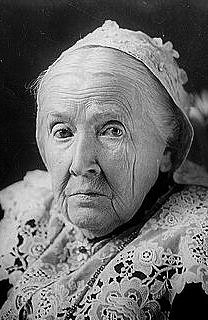I awoke in the grey of the morning, and as I lay waiting for dawn, the long lines of the desired poem began to entwine themselves in my mind, and I said to myself, I must get up and write these verses, lest I fall asleep and forget them!
So I sprang out of bed and in the dimness found an old stump of a pen, which I remembered using the day before. I scrawled the verses almost without looking at the paper.
Julia Ward Howe
Chaplain Charles C. McCabe, afterward a bishop of the Methodist Episcopal Church, was confined in Libby Prison [Richmond, Virginia] during a part of the [American] Civil War. In his famous lecture on The Bright Side of Life in Libby Prison
he used to tell this story of the arrival of the news from the Battle of Gettysburg [Pennsylvania]:
I had a relative in Richmond, a staunch rebel. The day they received the first tidings from Gettysburg he came to see me, his face wreathed in smiles: Have you heard the news?
What news?
Forty thousand Yankee [Union Army] prisoners on their way to Richmond!
I was astounded! In dumb amazement I listened to the Confederate officers speculating where the new prisoners should be stowed away, and how they were to be fed. I went upstairs and told the news. Despondency settled down into every heart.
That night as we assembled for family prayers
and sang, as was always our wont, the Long-meter Doxology, it trembled out from quavering voices up to Him who has said, Glorify me in the fires.
I slept none that night, listening wearily to the watch calling the hours and singing out as he did so, All’s well.
When the day broke I waited for the footsteps of Old Ben,
a character well known to every inmate of Libby. He was the prison news agent and sold papers at twenty-five cents apiece.
At last his footfall came. He pushed the door ajar, looked around for a moment on the sleepers, and then raising his arms he shouted, Great news in de papers!
Did you ever see a resurrection? I never did but this once. O, how those men sprang to their feet! And what was the news?
The telegraph operator at Martinsburg [West Virginia], when putting those ciphers to the four, had clicked the instrument once too often. There was a mistake of thirty-six thousand! More yet! [General Robert E.] Lee was driven back, the Potomac [River] was swollen, the pontoons [floating bridges] were washed away!
I have stood by when friends long-parted meet again with raining tears and fond embrace, but never did I witness such joy as swept into those strong men’s faces, where the deepest sorrow sat but a moment before.
Well, what did we do? Why, we sang; sang as saved men do; sang till Captains Flynn and Sawyer, immured in the lowest dungeons below and doomed to die within ten days, heard us and wondered; sang till the very walls of Libby quivered in the melody as five hundred of us joined in the chorus of Mrs. Julia Ward Howe’s Battle Hymn of the Republic, Mine eyes have seen the glory of the coming of the Lord.
This hymn was written in 1861, at the beginning of the Civil War in the United States, inspired partly by the scene of troops hurrying from the North to Southern battlefields. All during that terrible struggle it was the great war song of the Union armies.
Price, pp. 32–33
